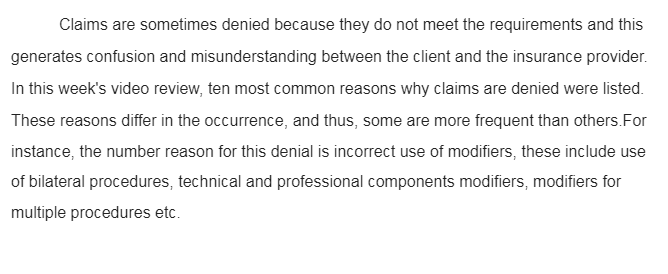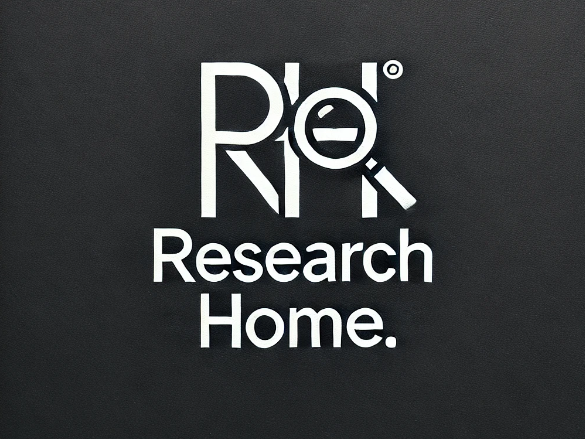Reasons for Denied Health Insurance Claims
In this week’s Video Review, it describes the 10 Most Common Reasons for a Denied Claim. Of the 10 most common reasons for a denied claim: (1) What do you think the number one reason is for a denied claim and why? (2) Which one reason is the most easily prevented and why? 1 PAGE DOUBLE SPACE ARIAL FONT (NO FORMATTING NECESSARY)
—————————————————-
We are now going to review the top 10 most popular reasons that a health insurance claim
is denied.
(1) Incorrect patient’s information (insurance ID# , date of birth): If you are submitting electronic claims, AVOID entering patient’s insurance number with characters like an asterisk (*) and dash (-) in between the alphanumeric numbers because these characters can be recognize by electronic as unrecognizable. Just check on this issue with the clearinghouse or your service provider. Always make a copy of your patient’s primary & secondary insurance card on file (copy front and back!). Make sure to get a copy of their new card (if there is a change).
(2) Patient’s non-coverage or terminated coverage at the time of service: That is why, it is very important that you check on your patient’s benefits and eligibility before see the patient. When you don’t verify in advance, you run the risk not receiving payment for the service rendered to the patient.
(3) CPT/ICD9 Coding Issues (requires 5th digit, outdated codes)— be careful also with your secondary code! Claims may be denied even if the problem was just because of the secondary CPT/ICD9 code: Discuss solving the coding error rather than how much you want to get reimbursed. Most of the insurance companies will help you with codes (in fairness!!) and they also inform you on outdated codes, or codes that requires a 5th digit. Be nice with the claims department! Also, under no circumstances can you authorize a code change UNLESS you are the coder. Stay confined within the parameters of your job description even though you may be aware of the necessary solution.18
(4) Incorrect use of modifiers! (be careful with bilateral procedures!, modifiers for professional and technical component, modifiers for multiple procedures, postoperative period, etc.).
(5) No precertification or preauthorization obtained (if required): It is so hard to file an appeal when the claim or service was non-pre-certified. Avoid it from happening!
(6) No referral on file (if required) Note: HMOs always requires a referral! (remember that!)
(7) The patient has other primary insurance or the patient’s claim is for workman’s comp or auto accident claim! It is the responsibility of your front desk staff to get all the necessary information before the patient can be seen. Remember that if this is a workman’s comp or an auto accident claim, you need a claim number and the adjustor’s name. Services are always preauthorized!
(8) Claim requires documentation & notes to support medical necessity A well documented medical records is a good practice!
(9) Claim requires referring physician’s info to include a NPI or national provider identifier.
(10) Untimely filing: This means that the claim was received by the insurance company past their allotted time limit for submission. Unfortunately most of the insurances does not accept your billing records on your office computer that shows that date(s) you billed the insurance! If you are submitting claims by electronic, make sure you generate transmission reports/receipts. Your reports must read “accepted” and not “rejected”. File all these transmittal reports/ and receipts and a very safe place! If you are sending claims by paper or postal mail, it is a good idea to send your claims as certified mail with tracking number, keep your receipts!
Answer Preview-Reasons for Denied Health Insurance Claims

